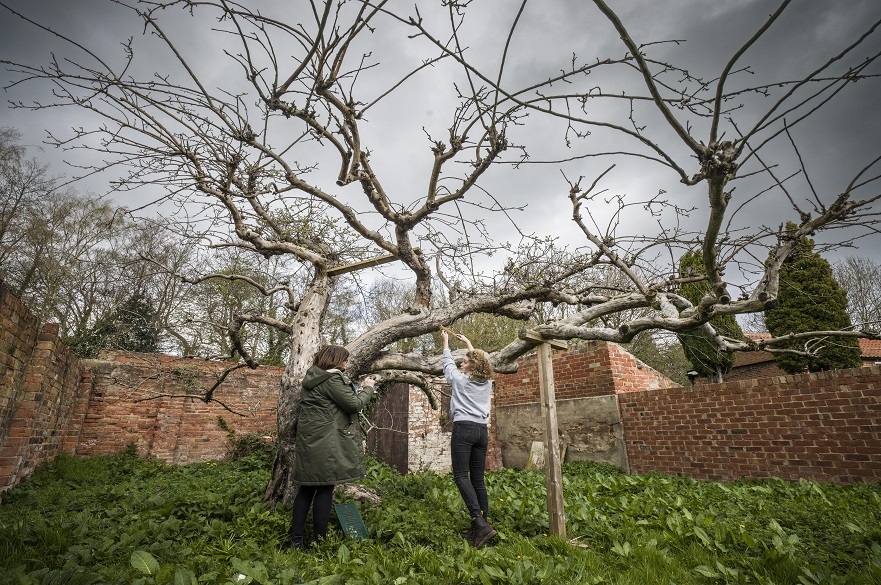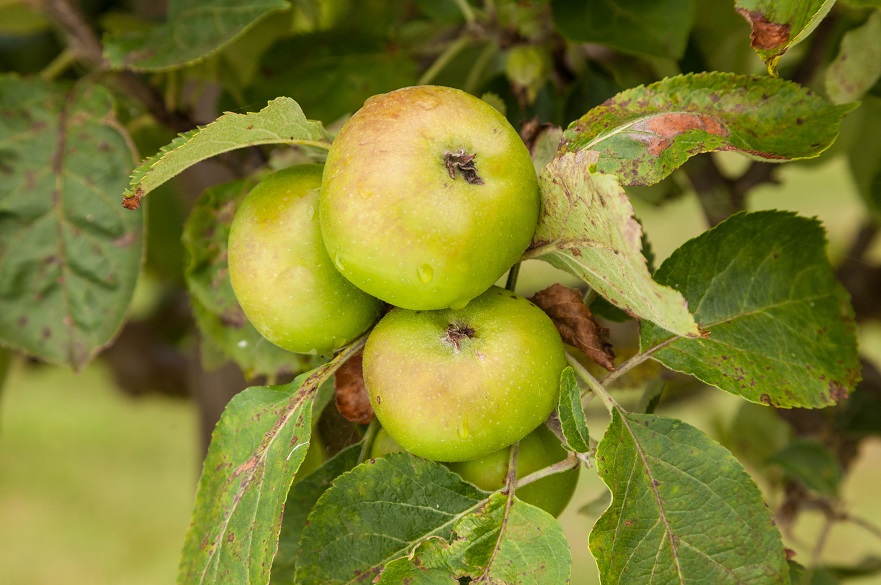Original Bramley Apple tree to be part of Ancient Canopy to celebrate The Queen’s Platinum Jubilee
The original Bramley apple tree has been chosen as part of a nationwide network of 70 Ancient Trees to be dedicated to The Queen in celebration of the Platinum Jubilee.
By Dave Rogers | Published on 3 May 2022
Categories: Press office; Research; School of Animal, Rural and Environmental Sciences;

Nottingham Trent University is the custodian of the tree, which was grown from a pip more than 200 years ago in the town of Southwell, a short distance from the university’s Brackenhurst Campus.
The Queen’s Green Canopy has announced the network of 70 Ancient Woodland and 70 Ancient Trees across the United Kingdom, which will form part of the Ancient Canopy to celebrate Her Majesty’s 70 years of service.
The initiative was launched by His Royal Highness The Prince of Wales, who is Patron of The Queen’s Green Canopy, under one of the Ancient Tree dedications - the old Sycamore located at Dumfries House in Scotland.
Mary Ann Brailsford planted the pip which grew into the original Bramley apple tree in the garden on Church Street between 1809-1815. More than 40 years later new occupier Matthew Bramley allowed local gardener Henry Merryweather to take cuttings from the tree to grow in his family’s nursery – provided they had the name ‘Bramley’s Seedling’.
The first recorded sale of a Bramley was on October 31, 1862, when Mr Merryweather sold three Bramley apples for two shillings.
Today there are more than 300 Bramley growers in England, with about 83,000 tonnes of the apples grown annually in the UK alone. The apples are very large and typically used in desserts.
The university – which became custodian of the tree after purchasing two cottages for student accommodation – closely monitors the condition of the tree.
It is very old for a fruit tree, has been infected with incurable honey fungus for many years and is slowly coming to the end of its natural life.
Nottingham Trent University Vice-Chancellor, Professor Edward Peck, said: “The Bramley apple is a much-loved part of our local and national heritage and it is fitting that the original tree has been acknowledged and celebrated in this way. NTU is proud to be custodian of the tree and the University will continue to engage with the local and wider community to promote the heritage and science of the Bramley apple.”

About 83,000 tonnes of Bramley apples are grown annually in the UK alone (Image: Roger Payne DTMedia.co)
Julia Davies, Head of Environmental Science in Nottingham Trent University’s School of Animal, Rural and Environmental Sciences, said: “The original Bramley apple tree is a cherished symbol of Southwell and we are delighted that it has been selected to be part of this dedication.”
Established over hundreds of years, the chosen woodlands and trees represent the diverse canopy of the four nations and is a celebration of our living heritage. All the woodlands and trees have a story to tell. Some are famous specimens and others have a local significance.
These ancient natural spaces hold significance and meaning for so many people in many different ways. They are symbols of community pride, places to connect socially and vital spaces for health and wellbeing activities.
By sharing the stories behind the ancient woodlands and trees, as well as the incredible efforts that are made to protect them, The Queen’s Green Canopy aims to raise awareness of these treasured habitats and the importance of conserving them for future generations.
Notes for Editors
Press enquiries please contact Dave Rogers, Public Relations Manager, on telephone +44 (0)115 848 8782, or via email.
The Queen’s Green Canopy (QGC) is a unique tree planting initiative created to mark Her Majesty’s Platinum Jubilee in 2022, which invites people from across the United Kingdom to “Plant a Tree for the Jubilee”. More information here: https://queensgreencanopy.org/
As well as inviting the planting of new trees, The Queen’s Green Canopy will dedicate a network of 70 Ancient Woodlands across the United Kingdom and identify 70 Ancient Trees to celebrate Her Majesty’s 70 years of service.
Inclusion on the QGC list is a symbolic gift which involves the voluntary dedication of forests and woodland – there is no land/title transfer. The nominated Woodlands and Trees met a specific criterion set out by the QGC. There is no set age for a tree to be considered ancient, as different species age at different rates.
Further information: https://queensgreencanopy.org/ancient-trees-and-ancient-woodland/
The dedicated trees and woodlands occur in rural and urban spaces, natural and planted settings. There is a range of ownership including large landowners, local authorities and private individuals.
For enquires regarding The Queen’s Green Canopy please contact: press@queensgreencanopy.org
Nottingham Trent University (NTU) received the Queens Anniversary Prize for Higher and Further Education in 2021 for cultural heritage science research. It is the second time that NTU has been bestowed the honour of receiving a Queen’s Anniversary Prize for its research, the first being in 2015 for leading-edge research on the safety and security of global citizens. NTU was awarded Outstanding Support for Students 2020 (Times Higher Education Awards). It was the University of the Year 2019 (Guardian University Awards, UK Social Mobility Awards), Modern University of the Year 2018 (Times and Sunday Times Good University Guide) and University of the Year 2017 (Times Higher Education Awards). NTU is one of the UK’s largest universities, with over 33,000 students and more than 4,000 staff located across five campuses. It has an international student population of 4,000 and an NTU community representing around 160 countries. In the past 15 years, NTU has invested £450 million in tools, technology and facilities. NTU is in the UK’s top 10 for number of applications and ranked first for accepted offers (2019 UCAS UG acceptance data) It is also among the UK’s top five recruiters of students from disadvantaged backgrounds. 75% of NTU students go on to graduate-level employment or graduate-entry education / training within fifteen months of graduating (Guardian University Guide 2021). NTU is 4th globally (and 3rd in the UK) for sustainability in the 2021 UI Green Metric University World Rankings (out of more than 900 participating universities).